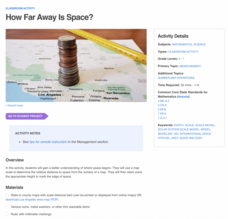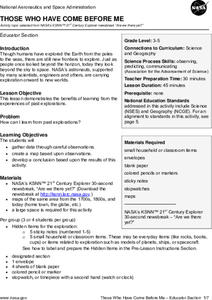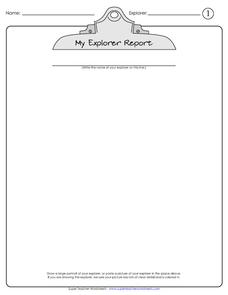American Museum of Natural History
Space Travel Guide
Scholars showcase their narrative writing skills with a science fiction writing assignment. Six pages present writers with a question to answer accompanied by a detailed picture to draw. All together, pages create a space-travel guide.
DocsTeach
The Space Race: Project Mercury
Race to the moon! An engaging activity focuses on NASA's Project Mercury and the Space Race. Scholars read a memorandum regarding the project and explore how it fueled Cold War tensions. Academics complete a worksheet and discuss the...
NASA
How Far Away Is Space?
Space is about 60 miles from the surface of Earth. Pupils make calculations to model that distance by stacking coins the appropriate height using scale. They then explore the distance to objects in space such as satellites and the space...
American Museum of Natural History
Space Jell-O
Might as well learn about how space bends around massive objects while making dessert. A remote learning resource provides an opportunity for scholars to model how stars and planets bend space. They use Jell-O to represent space and...
American Museum of Natural History
Space Jell-O
A tasty treat lends its curious substance to space exploration. Mimicking the discoveries of Albert Einstein, young astronomers beginning by making a batch of Jello-O, then four hours later, scholars place edible objects that act like...
DiscoverE
Spaceship to Mars
Feel like a rocket scientist for the day. Using only paper and tape, scholars create a framework for a spaceship to Mars. Each sheet of paper costs $10 million and each piece of tape costs $100,000. Make sure you stay within budget!
NASA
Design a Crew Exploration Vehicle
Make a splash from space. Participants use the engineering design process to create a waterproof space exploration vehicle capable of an upright landing. Young engineers test and modify designs as needed and participate in a group...
NASA
Make a Planetary Exploration Balloon
Balloons aren't just for parties! An inquiry-based lesson explores the idea of using balloons for space exploration. Learners become engineers as they attempt to control the ascent and descent of a helium balloon using different masses.
NASA
Explore Mars With Scratch
Learn what it takes to explore Mars in the comfort of a classroom. Individuals experiment with computer programming using a free online resource while learning about the factors affecting Mars Rover explorations. They create a...
NASA
Build a Light Detector Inspired by Space Communications
Data can travel on light waves ... who knew!?! Pupils explore the idea of using light waves to transmit data through space. They then build their own boards that detect a specific wavelength of light.
University of Wisconsin
Infiltration Test: Exploring the Flow of Water Through Soils
Soil scientists gain experience with an infiltrometer can to determine the infiltration rates at different locations on campus. If you are using the entire unit, the class has already analyzed water flow and soil types, so they should...
NASA
Exploring the Colors of Mars
Minerals on Mars are not that different than those on Earth. Using mineralogy concepts and satellite images, individuals use color to highlight the different surface minerals on Mars when creating a model of the planet. They enhance...
NASA
Exploring Exoplanets with Kepler
Calculate the movement and properties of planets like professional astronomers! Scholars use Kepler's third law to find Mercury and Venus's distance from the sun. Using changes in brightness of distant stars and Kepler's third law,...
NASA
Resolving 3-Plane Traffic Conflicts by Changing Speed—Problem Set F
Get three planes to line up safely. Individuals work through a set of problems to eliminate spacing conflicts between three airplanes in flight. The pupils use their knowledge to change the airplanes' speed or route to meet a...
DocsTeach
Landing a Man on the Moon: President Nixon and the Apollo Program
Take the small step for man and giant leap for mankind with the Apollo astronauts using primary sources. Young historians explore the documents related to the American space program up through the lunar landing, including presidential...
NASA
Touchdown
Just how do astronauts stay safe during moon landings? Here's an activity that allows investigators to use the engineering process to explore how shock absorbers protect astronauts during landing. Applying knowledge of gravity, force,...
NASA
Code a Mars Sample Collection Video Game
Video game designer meets science in a lesson examining the science of space exploration. Young learners use online software to create a video game that mimics the process of sample collection on Mars. They must make appropriate...
Super Teacher Worksheets
Our Solar System Scavenger Hunt Activity
Send students on a search for facts about the solar system with this scavenger hunt activity. Whether they are finding out how far the sun is from the earth, or the names of all four gas giants, this resource will engage young...
Baylor College
Examining the Heart
Break hearts with this lesson plan: chicken or sheep hearts, that is! Your class examines the external and internal structure of the heart with a dissection activity. A handy anatomy resource provides the necessary materials for...
Curated OER
Those Who Have Come Before Me
Class members are transformed into explorers as they work in groups to locate hidden items and map their journey along the way. They then leave clues for other groups of learners to follow, and ultimately discover how past explorations...
Scholastic
Lesson Three: The Earth, Movement in Space
If you feel like you're standing still, you're wrong! The Earth is constantly rotating and orbiting under our feet. Demonstrate the Earth's movement within the solar system with a collaborative activity. With a candle or lamp in the...
NASA
Roving on the Moon
Build a rover for pennies in a fun-filled activity! Young engineers design, build, test, and evaluate a lunar rover model. Using rubber bands, plastic straws, and cardboard, teams collaborate to make a rover model with spinning wheels....
IMAX
Hubble
Explore what it takes to service the Hubble telescope. In the set of three activities, groups investigate several aspects of the Hubble telescope, including robotic arms used during repairs, spacesuits, and extravehicular activity (EVA)...
Super Teacher Worksheets
My Explorer Report
This is the perfect resource to accompany your class project on famous explorers! Learners detail basic information about their chosen explorer, his/her main events of exploration and means of transportation, and finally,...























